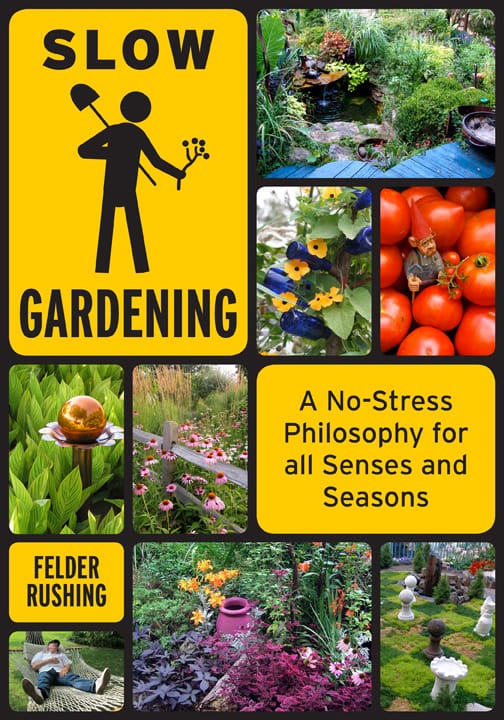| Pages: | 232 pages |
| Book Art: | Color photos throughout, maps |
| Size: | 7.25 x 10 inch |
| Publisher: | Chelsea Green Publishing |
| Pub. Date: | June 27, 2011 |
| ISBN: | 9781603582674 |
Slow Gardening
A No-Stress Philosophy for All Senses and All Seasons
Thanks to the resurgence of home and community gardening, more and more people are discovering the pleasure of biting into a sun-ripened tomato picked right off the vine, the earthy smell of freshly turned soil, and the cheerful harbingers of spring such as daffodils, irises, and pansies. But they are also discovering that gardening can be a heck of a lot of work. So what happens when keeping up with the weeds turns into a full-time job? What do you do when gardening becomes stressful?
Slow Gardening to the rescue! Inspired by Slow Food, an international movement that promotes local food systems and biological and cultural diversity, the slow-gardening approach can help us all appreciate and enjoy our gardens more, year in and year out.Felder Rushing, a well-known and truly one-of-a-kind garden expert, offers this practical yet philosophical approach to gardening – one that will help you slow down, take stock of your yard, and follow your own creative whimsy in the garden.
Slow Gardening will inspire you to slip into the rhythm of the seasons, take it easy, and get more enjoyment out of your garden, all at the same time.
Reviews and Praise
Kirkus Reviews-
Achieve gardening nirvana by employing basic principles and a don't-worry-be-happy attitude.All too often, gardeners make the mistake of becoming preoccupied with what the neighbors might think instead of designing gardens for their own pleasure. Rushing (Tough Plants for Southern Gardens, 2003, etc.) cautions gardeners against falling into this trap; plant perfection, he writes, especially cosmetic perfection, is not obtainable-so why even try? If something doesn't work out, just throw it in the compost pile and plant something else. It is this attitude that sets this book apart from other gardening how-to books. Embracing the author's gardening philosophy will allow readers to savor their time out in the dirt. Rushing's bit-by-bit approach is likely to encourage gardeners of all enthusiasm levels. The author includes enlightened strategies gardeners should practice in order to achieve optimal results, including tips for how to make their own compost-or at least keep a pile of leaves that will eventually turn into compost. He suggests reducing the size of the lawn and several varieties of low-maintenance plants. As for pests? Avoid the pesticides and opt for pest-resistant plants instead. When it comes to fertilizer, Rushing advises for quality over quantity.The author's slow and natural approach should strike a chord with those who are tired of quick-fix alternatives in the backyard.
More Reviews and Praise
Publishers Weekly-
Though the title suggests that this will be a guide to low-maintenance, low-anxiety gardening, garden lecturer and author Rushing (Passalong Plants) invites gardeners to make enjoyment and creative expression central to the gardening experience. Whether one loves strict formality or careless chaos, Rushing delightfully urges gardeners to follow their own bliss in the garden. Marigolds in military lines, flocks of lawn flamingos, and homemade art are as welcome as boxwood parterres and immaculate lawns. Rushing is a horticultural inspirational speaker who offers solid advice along with encouragement. Beginning gardeners will benefit from his hard-won tricks of the trade, proven plant combinations, and easy maintenance plans. The more experienced will appreciate his tips on making compost, propagating plants, and engaging all the senses in the garden. All will find some inspiration in his infectious enthusiasm and good humor. 126 color photos.
"Felder knows that if gardening isn't fun, it isn't worth doing. So if 'power gardening' has emptied your wallet and sent your blood pressure soaring like a condor on caffeine, give yourself a break. Try Slow Gardening."--Steve Bender, Southern Living Magazine
"Felder's enjoyment-based approach, which is what I do and teach but didn't have a name for til now, is sustainable gardening at its most enjoyable-without the usual anxiety over doing something wrong."--Susan Harris, cofounder, GardenRant and founder, Sustainable-Gardening
"Slow Gardening is a delight-a welcome stress-free approach, refreshing in its simplicity and firmly placing the gardener in their own space, at their own pace."--Sandy Felton, Reckless Gardener UK
"Between the covers of Slow Gardening, Felder mixes his famous Southern wit and wisdom with hard science. Leave it to Felder to come up with the 'slow' theme that entices beginning and intermediate gardeners to get their hands into the dirt in a variety of unique ways."--Rosalind Creasy, author, Edible Landscaping and member, Garden Writers Association Hall of Fame







